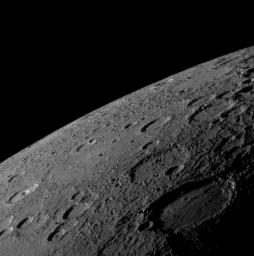MESSENGER Views Mercury’s Horizon
Caption:
As the MESSENGER spacecraft drew closer to Mercury for its historic first flyby, the spacecraft's Narrow Angle Camera (NAC) on the Mercury Dual Imaging System (MDIS) acquired an image mosaic of the sunlit portion of the planet. This image is one of those mosaic frames and was acquired on January 14, 2008, 18:10 UTC, when the spacecraft was about 18,000 kilometers (11,000 miles) from the surface of Mercury, about 55 minutes before MESSENGER's closest approach to the planet.
The image shows a variety of surface textures, including smooth plains at the center of the image, many impact craters (some with central peaks), and rough material that appears to have been ejected from the large crater to the lower right. This large 200-kilometer-wide (about 120 miles) crater was seen in less detail by Mariner 10 more than three decades ago and was named Sholem Aleichem for the Yiddish writer. In this MESSENGER image, it can be seen that the plains deposits filling the crater's interior have been deformed by linear ridges. The shadowed area on the right of the image is the day-night boundary, known as the terminator. Altogether, MESSENGER acquired over 1200 images of Mercury, which the science team members are now examining in detail to learn about the history and evolution of the innermost planet.
Mission Elapsed Time (MET) of image: 108821596
Background Info:
These images are from MESSENGER, a NASA Discovery mission to conduct the first orbital study of the innermost planet, Mercury. For information regarding the use of images, see the MESSENGER
image use policy
.
Cataloging Keywords:
| Name |
Value |
Additional Values |
| Target |
Mercury |
|
| System |
|
|
| Target Type |
Planet |
|
| Mission |
MESSENGER |
Mariner |
| Instrument Host |
MESSENGER |
Mariner 10 |
| Host Type |
Orbiter |
Flyby Spacecraft |
| Instrument |
Mercury Dual Imaging System (MDIS) |
|
| Detector |
Narrow Angle Camera (NAC) |
|
| Extra Keywords |
Crater, Grayscale, Impact, Shadow |
| Acquisition Date |
|
| Release Date |
2008-01-17 |
| Date in Caption |
2008-01-14 |
|
| Image Credit |
NASA/Johns Hopkins University Applied Physics Laboratory/Carnegie Institution of Washington |
| Source |
photojournal.jpl.nasa.gov/catalog/PIA10176 |
| Identifier |
PIA10176 |

 Planetary Data System
Planetary Data System
